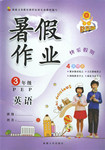题目内容
The death of Kim Jong I1 was great surprise to the world and it is reported that he died while he was traveling to inspect somewhere in flesh.
- A.the; a
- B.不填; a
- C.a; 不填
- D.a; the
试题分析:考查冠词。本题的第一空是抽象名词surprise具体化,指一件让人惊讶的事情,或者一个让人惊讶的人。第二空是固定词组in the flesh亲身;句意:Kim Jong I1的死亡对全世界来说是一个让人惊讶的事情。据报道他是亲身去视察某地的时候去世的。故D正确。
考点:考查冠词
点评:本题着重理解定冠词和不定冠词的区别,对于冠词特指和泛指的考察是历年来高考的必考点,平时的学习要多进行积累,仔细分析特指还是泛指。同时,更为重要的是要多去积累习惯表达,特殊表达,这也是近几年高考习惯考的地方。总而言之,多解题、多理解、多积累才是制胜的法宝。

 第三学期赢在暑假系列答案
第三学期赢在暑假系列答案 学练快车道快乐假期暑假作业新疆人民出版社系列答案
学练快车道快乐假期暑假作业新疆人民出版社系列答案 Alfred Nobel became a millionaire and changed the ways of mining,construction,and![]() warfare as the inventor of dynamite(炸药).On April 12,1888,Alfred's brother Ludwig died of heart attack.A major French newspaper _21_ his brother for him and carried an article _22_ the death of Alfred Nobel.“The merchant of death is dead.”the article read.“Dr.Alfred
warfare as the inventor of dynamite(炸药).On April 12,1888,Alfred's brother Ludwig died of heart attack.A major French newspaper _21_ his brother for him and carried an article _22_ the death of Alfred Nobel.“The merchant of death is dead.”the article read.“Dr.Alfred![]() Nobel,who became _23_ by finding ways to kill more people faster than ever before,died
Nobel,who became _23_ by finding ways to kill more people faster than ever before,died![]() yesterday.”Nobel was _24_ to find out not that he had died,but that,when his time was up,he would be thought of only as one who profited from _25_ and destruction.
yesterday.”Nobel was _24_ to find out not that he had died,but that,when his time was up,he would be thought of only as one who profited from _25_ and destruction.![]()
![]()
To make sure that he was _26_ with love and respect.Nobel arranged in his _27_ to![]() give the largest part of his money to _28_ the Nobel prizes,which would be awarded to people
give the largest part of his money to _28_ the Nobel prizes,which would be awarded to people![]() who made great _29_ to the causes of peace,literature,and the sciences.So _30_ ,Nobel
who made great _29_ to the causes of peace,literature,and the sciences.So _30_ ,Nobel![]() had to die before he realized what his life was really about.
had to die before he realized what his life was really about.![]()
![]()
21.A.found | B.misunderstood | C.mistook | D.judged |
22.A.introducing | B.announcing | C.implying | D.advertising |
23.A.famous | B.sick | C.rich | D.popular |
24.A.upset | B.anxious | C.excited | D.pleased |
25.A.death | B.disease | C.trouble | D.attack |
26.A.repaid | B.described | C.supported | D.remembered |
27.A.book | B.article | C.will | D.contract |
28.A.establish | B.form | C.develop | D.promote |
29.A.additions | B.sacrifices | C.changes | D.contributions |
30.A.generally | B.basically | C.usually | D.certainly |
I had an experience some years ago, which taught me something about the ways in which people make a bad situation worse by blaming themselves. One January, I had to hold two funerals on successive days for two elderly women in my community. Both had died “full of years”, as the Bible would say. Their homes happened to be near each other, so I paid condolence(吊唁) calls on the two families on the same afternoon.
At the first home, the son of the deceased(亡故的)woman said to me, “If only I sent my mother to Florida and gotten her out of this cold and snow, she would be alive today. It’s my fault that she died. ”At the second home, the son of the other deceased woman said, “If only I hadn’t insisted on my mother’s going to Florida, she would be alive today. That long airplane ride, the sudden change of climate, was more than she could take. It’s my fault that she’s dead.”
You see that any time there is a death, the survivors will feel guilty. Because the course of action they took turned out bad, they believe that the opposite course keeping Mother at home, putting off the operation would have turned out better. After all, how could it have turned out any worse?
There seem to be two elements involved in our willingness to feel guilty. The first is our pressing need to believe that the world makes sense, that there is a cause for every effect and a reason for everything that happens. That leads us to find patterns and connections both where they really exist and where they exist only in our minds.
The second element is the view that we are the cause of what happens, especially the bad things that happen. It seems to be a short step from believing that every event has a cause to believing that every disaster is our fault. The roots of this feeling may lie in our childhood.
A baby comes to think that the world exists to meet his needs, and that he makes everything happen in it. He wakes up in the morning and summons the rest of the world to his tasks. He cries, and someone comes to attend to him. When he is hungry, people feed him, and when he is wet, people change him. Very often, we do not completely outgrow that childish view that our wishes cause things to happen.
1.The author had to conduct the two women’s funerals probably because____.
|
A.he was minister of the local church |
B.he wanted to comfort the two families |
|
C.he was an official from the community |
D.he had great pity for the deceased |
2.People feel guilty for the death of their loved ones because ____.
|
A.they couldn’t find a better way to express their sorrow. |
|
B.they had neglected the natural course of events |
|
C.they believed that they were responsible |
|
D.they didn’t know things often turn in the opposite direction |
3.According to the passage, the underlined part in paragraph 4 probably means that _____
|
A.everything in the world is predetermined |
|
B.there’s an explanation for everything in the world |
|
C.the world can be interpreted in different ways |
|
D.we have to be sensible in order to understand the world |
4. What’s the idea of the message?
|
A.Life and death is an unsolved mystery |
|
B.Never feel guilty all the time because not every disaster is our fault |
|
C.Every story should have a happy ending |
|
D.In general, the survivors will feel guilty about the people who passed away |